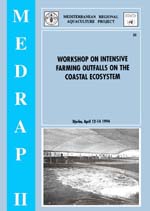
Djerba, Tunisia, April 12–14 1994
MEDRAP II
RAB/89/005-RER/87/009
FIELD DOCUMENT
94/30
 | WORKSHOP ON INTENSIVE FARMING OUTFALLS ON THE COASTAL ECOSYSTEM Djerba, Tunisia, April 12–14 1994 |
Edited by MEDRAP II Regional Center
Tunis - Tunisia
All rights reserved. No part of this publication may be reproduced, stored in a retrieval system, or transmitted in any form or by any means, electronic, mechanical, photocopying or otherwise, without the prior permission of the copyright owner. Applications for such permission, with a statement of the purpose and extent of the reproduction, should be addressed to the Director, Publications Division, Food and Agriculture Organisation of the United Nations, Viale delle Terme di caracalla, 00100 Rome, Italy.
Preparation of this Document
This document is one of a series of documents prepared during the course of the Project identified in the title page. The conclusions and recommendations given were considered appropriate at the time it was prepared. They may be modified in the light of further knowledge gained at subsequent stages of the Project.
The designations employed and the presentation of the material in this document do not imply the expression of any opinion whatsoever on the part of the Food and Agriculture Organisation of the United Nations concerning the legal states of any country, territory, city or area or of its authorities, or concerning the delimitation of its frontiers or boundaries.
The opinions expressed by the Authors in this document are not necessarily those of FAO or the Governments of the participating contries.
This document was edited by Hassen AKROUT and Mohieddine BELKHIR in collaboration with Othman BÉJI and Neila KAFFEL, the revision was made by Michel LAMBŒUF.
Abstract
The Workshop on Intensive farming outfalls on the coastal environment took place in Djerba, Tunisia from 1 to 14 April 1994.
The main findings were that coastal aquaculture in the Mediterranean are not likely to result in significant ecological changes. Aquaculture sites should be carefully selected. Integrated aquaculture practices should be considered to improve protection of resources and environment.
Improvement of farm management techniques may improve conflicts between different environment users. Impact assessment and prediction methods should be developed.
Acknowledgements
The Editor would like to thank the Tunisia authorities, for their support to the organisation of this activity. Thanks are also addressed to the participants from Member/Associated countries who accepted to contribute to the workshop.
Note from the reviser
The revision and publication of this document could only be done a long time after the closure of the project. This has led to some difficulties in finalising the documents and implementing corrections, because authors and contributors as well as some of the original material or files were no longer available.
Therefore contributions from participants and sessions papers annexed to most of the document were left in their original form. No language corrections were introduced, the content was not modified and left under their respective authors responsibility.
Considering the above. we hope that the reader will understand that a standard of publication could not be maintained on a level as high as we would have like it to be.
United Nations Development Programme

Food and Agriculture Organisation of the United Nations

Hyperlinks to non-FAO Internet sites do not imply any official endorsement of or responsibility for the opinions, ideas, data or products presented at these locations, or guarantee the validity of the information provided. The sole purpose of links to non-FAO sites is to indicate further information available on related topics.
This electronic document has been scanned using optical character recognition (OCR) software. FAO declines all responsibility for any discrepancies that may exist between the present document and its original printed version.
• Cage Culture: Near-shore and off-shore culture
M.C.M. Beveridge (SCOTLAND)
• Environmental Interactions of Offshore Aquaculture
Michel Merceron (FRANCE)
• Nutrient Loading
M.C.M. Beveridge (SCOTLAND)
• Biological Impact of Aquaculture on the Environment
Michel Merceron (FRANCE)
• Geographical Information Systems (GIS) and Aquaculture
M.C.M. Beveridge (SCOTLAND)
• Socio-Cultural and Visual Impacts
M.C.M.Beveridge (SCOTLAND)
• Aquaculture site selection
Mare Kempf (FRANCE)
• Environmental Impact of Marine Finfish culture
Ivan Katavic (CROATIA)
• Selected Options for environmental management in Coastal aquaculture
UWE BARG (FAO)